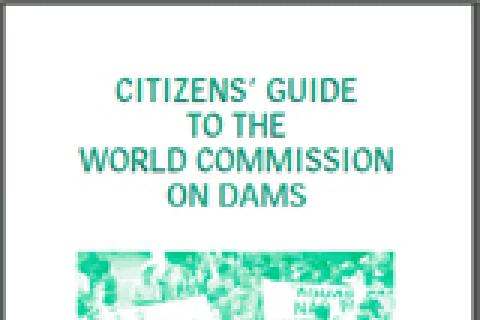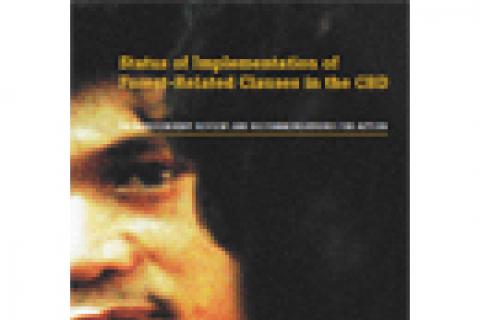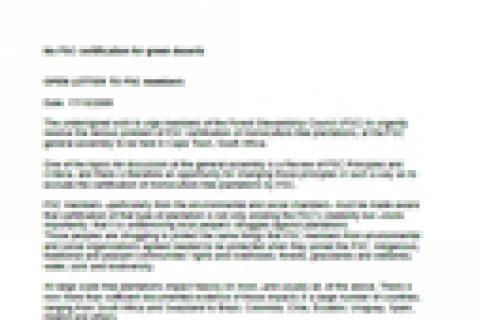A Brazilian industrial plantation project hoping to get a subsidy from the UN for sucking up carbon from the atmosphere has failed to make its case, according to the project's official validator.
Det Norske Veritas (DNV), a norwegian company assigned by the World Bank's Prototype Carbon Fund (PCF) to check the project's claims, says that it can't determine whether carbon could be held in the project's eucalyptus trees long enough to make any difference to the climate system.
Other information
Some conceptual errors are hard to die. Such is the case of the concept of "planted forests". Although increasingly weakened as a credible definition, the draft plan for implementation agreed upon in Bali during the last Preparatory Conference for the World Summit on Sustainable Development insists on calling plantations "forests."
Only available in Spanish -
Las investigaciones demuestran que las hidroeléctricas no sólo son destructivas social y ambientalmente, sino que aportan significativamente al calentamiento global por la descomposición que emite grandes volúmenes de dióxido de carbono y de metano, los dos gases del efecto invernadero más importantes.
Para los indígenas
Eduardo Galeano, one of the most profound and committed writers on the situation of Latin America and its peoples, is widely known within and outside the continent for his classic work “The Open Veins of Latin America”, published over 25 years ago. However this was not the culmination but rather the starting point of an untiring and relentless activity towards a freer and more equitable Latin America, reflected in many of his works published since then. Among them is the book “Úselo y tírelo,” (Use it and throw it out).
On July 20, 1999, Biogenetic S.A., a joint venture between Fundacion Chile (Santiago, Chile) and InterLink biotechnologies, (Princeton, NJ) announced the creation of a new venture for the development of "improved" forestry species: GenFor S.A.
The idea follows what biotech firms are already doing with corn, potatoes and soybeans. Using Bacillus thuringiensis, or Bt, a naturally occurring soil bacterium that kills pests if inserted into growing plants, researchers at Genfor in Chile say they are near to producing a commercially viable genetically engineered tree.
A coalition of Non-Governmental Organizations (NGOs) and Indigenous Peoples’ Organizations (IPOs) commissioned an independent review of the status of implementation, in 21 countries, of the Convention of Biological Diversity commitments related to forests, and came up with a number of recommendations for action.
By Aviva Imhof, Susanne Wong and Peter Bosshard.
Published by International Rivers Network.
This Citizens’ Guide to the World Commission on Dams is intended as a tool for people in their struggles for social justice and environmental protection.
Download the Guide in pdf
Commissioned by the Global Forest Coalition
This report is based on 21 country case studies, including Australia, Brazil, Cameroon, Canada, Chile, Colombia, Czech republic, Ghana, India, Indonesia, Kenya,Malaysia, the Netherlands, New Zealand/Aotearoa, Papua New Guinea, Russia, South Africa, Suriname, Uganda, United Kingdom, and Uruguay
By Liz Alden Wily.
Independent land tenure & community forest management adviser
Participatory forest management in Africa. An overview of progress and issues
The word "modern" is usually understood as meaning progress. In forestry, it clearly means the opposite, particularly --though by no means only-- with respect to biodiversity. Modern industrial forestry aims at the production of ever increasing volumes of wood per hectare, regardless of its impacts on people, soils, water and biological diversity.
At the end of UNFF1 (first session of United Nations Forum on Forests) in June 2001, NGOs and Indigenous Peoples Organizations (IPOs) decided that the real test for the UNFF would be in 2002 when the new Forum would address substantive issues instead of process and operational questions. The time came and UNFF2 was held.
Forests are very important for people who live in or close to forest areas and use forests for their livelihood. However, people’s use of forests for daily subsistence, provision of food, medicines, shelter and agricultural production and for their social, cultural and spiritual well- being, are commonly undervalued or ignored.




